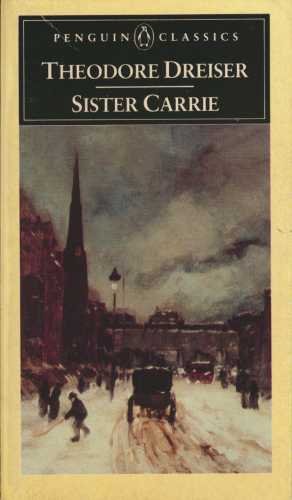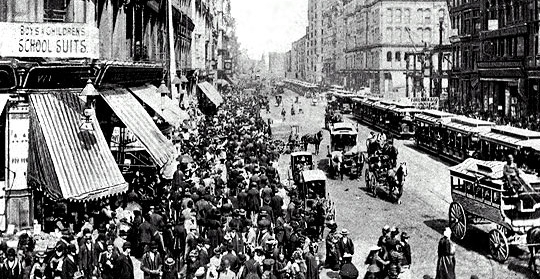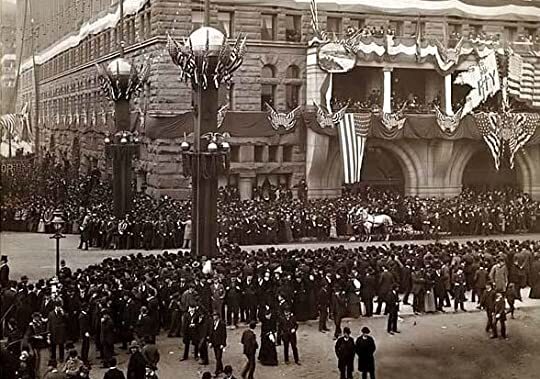What do you think?
Rate this book


499 pages, Paperback
First published November 8, 1900
This book was quite scandalous for its times - vulgar, immoral, risqué. It was ready to shake up the moral standards of its time with the unacceptable storyline: a young poor provincial woman Carrie Meeber comes to Chicago, gets disillusioned with "honest" overworked poverty, and before you know it, shacks up with first one man, then another (a married one, at that), and far from being suitably punished for such an immoral approach to life becomes a successful celebrated actress rolling in riches. Sordid, indeed!
“When a girl leaves her home at eighteen, she does one of two things. Either she falls into saving hands and becomes better, or she rapidly assumes the cosmopolitan standard of virtue and becomes worse.”
“She knew that out in Chicago this very day the same factory chamber was full of poor homely-clad girls working in long lines at clattering machines; that at noon they would eat a miserable lunch in a half-hour; that Saturday they would gather, as they had when she was one of them, and accept the small pay for work a hundred times harder than she was now doing. Oh, it was so easy now! The world was so rosy and bright.”Dreiser does not cut his heroine any slack. There are no illusions about the personality of Carrie Meeber. She has no redeeming qualities of excessive piety, unearthly compassion, admirable selflessness, exceptional kindness, awe-inspiring talent. She instead is a moderately-talented, practical and a bit selfish young woman longing for the beauty of life which to her quite circumscribed middle-class mind consists of comfortable life in pretty clothes and beautiful apartment, surrounded by everything that glitters but is not necessarily gold. Dreiser's descriptions of her mind and ambitions are frequently quite scathing:

“Self-interest with her was high, but not strong. It was, nevertheless, her guiding characteristic.”And yet Carrie does not need idealization or overwrought characterization to feel so real and alive through the pages of Dreiser's novel. And, unlike her almost-contemporaries Anna Karenina, Edna Pontellier and Emma Bovary, Carrie does not pay the price of death for daring to live the life that does not conform to the pre-defined ideal; instead, she thrives - even if it in Dreiser's wistful vision does not live up to any high standards:
“And yet she was interested in her charms, quick to understand the keener pleasures of life, ambitious to gain in material things.”
“Her imagination trod a very narrow round, always winding up at points which concerned money, looks, clothes, or enjoyment.”
“Know, then, that for you is neither surfeit nor content. In your rocking-chair, by your window dreaming, shall you long, alone. In your rocking-chair, by your window, shall you dream such happiness as you may never feel.”A woman without much agency, drifting on the waves of life that happen to take her into the direction of richness and fame? This was an accusation flung at Carrie from time to time. But consider that Carrie was never expected to have any agency whatsoever, instead expected to fulfill her role in society either as a pretty decoration or a choiceless drudge - and her refusal to accept these choices to me spells out enough agency to cause many a frown on the critics' faces in the early 1900s.
"The city has its cunning wiles, no less than the infinitely smaller and more human tempter. There are large forces which allure with all the soulfulness of expression possible in the most cultured human. The gleam of a thousand lights is often as effective as the persuasive light in a wooing and fascinating eye. Half the undoing of the unsophisticated and natural mind is accomplished by forces wholly superhuman. A blare of sound, a roar of life, a vast array of human hives, appeal to the astonished senses in equivocal terms."The city beckons and seduces, but refuses to nurture those it attracts. Carrie is left on her own, to fend for herself, to make her way in life - or rather, to drift on the waves of the stubborn stream of life, busy paddling along and trying not to drown.

When a girl leaves her home at eighteen, she does one of two things. Either she falls into saving hands and becomes better, or she rapidly assumes the cosmopolitan standard of virtue and becomes worse.
In the sunshine of the morning, beneath the wide, blue heavens, with a fresh wind astir, what fears, except the most desperate, can find a harbourage? In the night, or the gloomy chambers of the day, fears and misgivings wax strong, but out in the sunlight there is, for a time, cessation even of the terror of death.
She wanted pleasure, she wanted position, and yet she was confused as to what these things might be. Every hour the kaleidoscope of human affairs threw a new lustre upon something, and therewith it became for her the desired-the all.
Ah, she was in the walled city now! Its splendid gates had opened, admitting her from a cold, dreary outside. She seemed a creature afar off-like every other celebrity he had known.